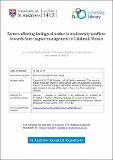Files in this item
Factors affecting feelings of justice in biodiversity conflicts : towards fairer jaguar management in Calakmul, Mexico
Item metadata
| dc.contributor.author | Lecuyer, Lou | |
| dc.contributor.author | Calmé, Sophie | |
| dc.contributor.author | Blanchet, F. Guillaume | |
| dc.contributor.author | Schmook, Birgit | |
| dc.contributor.author | White, Rehema M. | |
| dc.date.accessioned | 2020-07-05T23:35:43Z | |
| dc.date.available | 2020-07-05T23:35:43Z | |
| dc.date.issued | 2019-09 | |
| dc.identifier | 258912203 | |
| dc.identifier | 47f0e8ba-260f-4603-b326-a75511867830 | |
| dc.identifier | 85068469007 | |
| dc.identifier | 000488314700016 | |
| dc.identifier.citation | Lecuyer , L , Calmé , S , Blanchet , F G , Schmook , B & White , R M 2019 , ' Factors affecting feelings of justice in biodiversity conflicts : towards fairer jaguar management in Calakmul, Mexico ' , Biological Conservation , vol. 237 , pp. 133-144 . https://doi.org/10.1016/j.biocon.2019.06.017 | en |
| dc.identifier.issn | 0006-3207 | |
| dc.identifier.other | ORCID: /0000-0002-9669-0012/work/64697343 | |
| dc.identifier.uri | https://hdl.handle.net/10023/20209 | |
| dc.description | Funding was provided by Mitacs through a Globalink Research Award to MLL, BS and SC, a José-Sarukhan Excellence Award given by the Centro del Cambio Global y Sustentabilidad del Sureste to MLL, an Excellence Award from the Quebec Center for Biodiversity Science to MLL, and a grant from the Université de Sherbrooke to SC. | en |
| dc.description.abstract | Conservation focuses on environmental objectives, but neglecting social concerns can lead to feelings of injustice among some actors and thus jeopardise conservation aims. Through a case study on a biodiversity conflict around jaguar management in Southern Mexico, we explored actors' feelings of injustice and their associated determinants. We employed a framework distinguishing four dimensions of justice: recognition, ecological, distributive and procedural. By conducting and analysing 235 interviews with farmers and ranchers, we investigated what drive their feeling of injustice, namely their perceptions of the injustice itself, individual characteristics and interactions with their environment. The participants selected 10 statements representing criteria characterizing their feeling of justice toward jaguar management, which they compared using pair-wise comparisons. A pioneering statistical analysis, BTLLasso, revealed that self-interest assumptions were not upheld; feelings of injustice were only weakly influenced by experience of depredation. Feelings of injustice were influenced mainly by factors related to actors' intra-and inter-group relationships (e.g. perception of collective responsibility, perceived coherence in the group to which they identified). This nuanced understanding of how people build their perception of justice can inform fairer and more effective conservation approaches. Whilst details will be context specific, it emerged that building relationships and enabling debate over ecological responsibilities are important and conservation efforts should go beyond merely offering financial compensation. We conclude that perception of justice is a neglected but important aspect to include in integrative approaches to managing biodiversity conflicts, and that novel mixed methods can advance both conceptual and applied understanding in this area. | |
| dc.format.extent | 1203365 | |
| dc.language.iso | eng | |
| dc.relation.ispartof | Biological Conservation | en |
| dc.subject | Fairness | en |
| dc.subject | Paired comparison | en |
| dc.subject | Bradley-Terry-Luce Lasso | en |
| dc.subject | Self-interest motivation | en |
| dc.subject | Group identity | en |
| dc.subject | QH301 Biology | en |
| dc.subject | NDAS | en |
| dc.subject.lcc | QH301 | en |
| dc.title | Factors affecting feelings of justice in biodiversity conflicts : towards fairer jaguar management in Calakmul, Mexico | en |
| dc.type | Journal article | en |
| dc.contributor.institution | University of St Andrews. School of Geography & Sustainable Development | en |
| dc.contributor.institution | University of St Andrews. Scottish Oceans Institute | en |
| dc.contributor.institution | University of St Andrews. St Andrews Sustainability Institute | en |
| dc.identifier.doi | 10.1016/j.biocon.2019.06.017 | |
| dc.description.status | Peer reviewed | en |
| dc.date.embargoedUntil | 2020-07-06 |
This item appears in the following Collection(s)
Items in the St Andrews Research Repository are protected by copyright, with all rights reserved, unless otherwise indicated.

